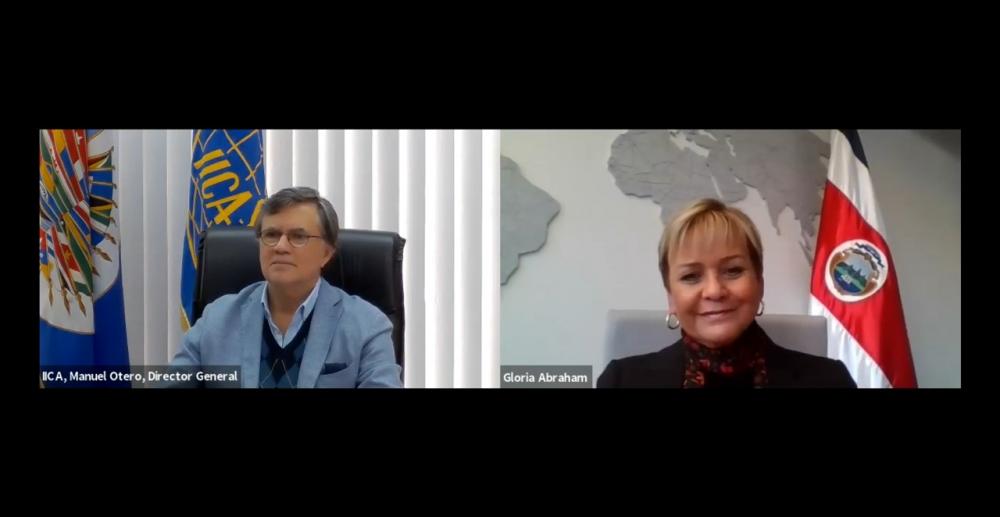The international food trade and food security go hand in hand

San Jose, 4 December 2020 (IICA). The global food trade has continued to be vigorous during the pandemic and has the ability to be one of the engines of global economic recovery.
The Food Security Monitor for the Americas, a publication of the Inter-American Institute for Cooperation on Agriculture (IICA), provides data on the first half of 2020, which clearly demonstrates the resilience of agrifood production even in this exceptionally difficult climate.
Whereas the falloff in activity due to Covid-19 caused international trade to plummet 21%, there was only a 5% drop in the trade of food products, whose distribution among countries is critical to global food security.
These numbers confirm that the sector has the capacity to recover from the crisis much earlier than others, says Gloria Abraham, Costa Rica’s Ambassador to the World Trade Organization (WTO), who is also this country’s former Minister of Agriculture and Livestock and the current Chair of the farm talks of the WTO, as the body governing global trade. She feels that this provides an excellent opportunity for countries in the Americas. Abraham is a specialist with longstanding experience in trade negotiations.
Abraham participated in a discussion with the Director General of IICA, Manuel Otero, on “Trade Policy and its Role in Food Security in the Americas”.
The conversation was one in a series of high-level discussions between Otero and senior officials and international specialists in agrifood issues.
In this case, the focus was on what is taking place during the pandemic, and particularly on the international scene that the countries of the Americas will face in its aftermath.
Abraham was Costa Rica’s Minister of Agriculture and Livestock between 2010 and 2014 (the first women to occupy that role) and IICA Representative in Mexico. She has also held prominent positions in the United Nations Development Program (UNDP) and the World Bank, among other international institutions.
She maintained that today one cannot speak of food security without also mentioning international trade.
“One in every six people on the planet are only able to survive, thanks to agricultural trade”, she pointed out. “Evidently, we are talking about different conditions across countries. Some are net food producing countries and other are net importers. We must establish stable and transparent linkages between them”.
Global value chains as an opportunity
From 1995—when the WTO Agreement on Agriculture came into effect—until 2020, global food trade has doubled to 1.5 trillion dollars, explained Abraham. However, the commercial importance of the sector is even greater, if one considers that one third of agrifood exports are marketed through global value chains.
Abraham explained that, “In these cases, the products cross borders twice. They are transported from producing countries as raw materials. Value is added to them in external markets and they re-enter these original markets as finished products and production inputs”. In her mind, “The golden opportunity for Latin America is to add value, through innovation and knowledge, in order to incorporate other links into the global value chains of our products”.
To this end, Otero signaled that Latin America and the Caribbean should establish long-term trade and agricultural policies, as these are decisive issues for the region’s present and future welfare.
The Director General of IICA remarked that, “Our countries’ participation in international agrifood trade is not dependent on surpluses. It is not that they participate when there is a surplus and then see what happens later. That is why they should adopt intelligent measures”.
Otero emphasized the complex geopolitical scenario in which international agrifood trade negotiations take place, considering the flood of emerging countries, the new dimension of sustainable agriculture, the internalization of environmental issues and the alarming 700 billion dollar budget for the various modalities of support and subsidies”, which according to Abraham, have been authorized by the WTO.
“Although not all of this sum is used, it represents about half of international trade in agrifood products”, explained the Costa Rican Representative to the WTO. “We have to review these issues to see what contribution each country can make, because tariffs on agricultural products are twice the consolidated tariffs on industrial products. And this can create trade distortions. We need to lower tariffs to make the international distribution of food more fluid”.
Manuel Otero spoke of the importance of the region paying more attention to opportunities available in our own hemisphere rather than looking outward. He reflected that, “There is a statistic that I find really striking: 86% of exports from the region go to China, the European Union and the United States, and only 14% of exports remain within the hemisphere”.
Abraham maintained that regional and multilateral issues should be seen as complementary. She said, “We must strengthen regional processes, but we must also continue to work on bilateral and multilateral processes”.
In response to Otero’s question about the key issues on the regional agricultural agenda, the Ambassador spoke about the enormous challenge of climate change adaptation.
“Although it is true that agriculture and food production contribute to increasing greenhouse gas emissions, there are also very valuable Latin American and Caribbean practices that are mitigating carbon dioxide emissions”, she insisted. “Our countries have been gradually adapting to the demands and agriculture continues to be one of the economic activities with the greatest potential, not only for wealth creation, but also for guaranteeing food security and working on poverty reduction”.
More information:
Institutional Communication Division, IICA.
comunicacion.institucional@iica.int